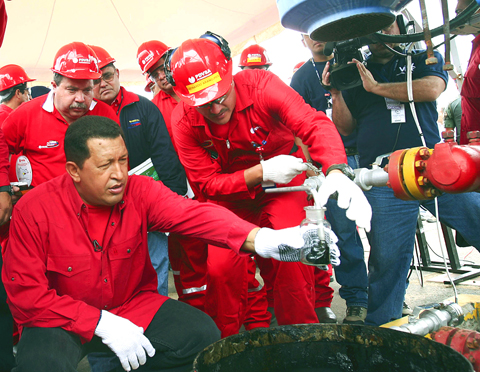Venezuelan President Hugo Chavez on Wednesday announced a US$16 billion deal with China to drill for oil in the resource-rich Orinoco basin.
“Yesterday [Tuesday], a deal was signed in Beijing for the Orinoco basin. It sets out a Chinese investment of US$16 billion over the next three years,” Chavez said at a public event.
He gave few details of the pact and did not name the Chinese companies involved, but said they would form a joint venture with state-owned Petroleos de Venezuela (PDVSA) to produce 450,000 barrels a day of extra heavy crude.

PHOTO: AFP
Venezuela, a founding member of the oil cartel OPEC and Latin America’s top oil exporter, announced on Saturday that it had signed a similar accord with a Russian consortium.
The deal will see the group of five Russian companies invest more than US$20 billion over three years, and gives them rights to drill for oil in the part of the Orinoco oil belt.
PDVSA said production with the Russian companies on the massive Junin 6 heavy crude block would begin by 2012. Junin 6 is estimated to hold 53 billion barrels of heavy crude, making it one of the world’s largest reserves.
That joint venture — with the Russian companies Rosneft, Lukoil, Gazprom, TNK-BP and Surgutneftegaz — is expected to produce 450,000 barrels a day by 2012, Chavez said.
Chavez on hailed the two deals saying the total would boost production by 900,000 barrels a day, which would be marketed along with Russian and Chinese companies.
“In addition, there will be a flood of technology into the country, with China going to build drilling platforms, oil rigs, railroads, houses,” Chavez said.
Chavez said that during his recent visit to Moscow he signed the venture that would give PDVSA a 60 percent stake in the firm, with 40 percent to the consortium.

Conflict with Taiwan could leave China with “massive economic disruption, catastrophic military losses, significant social unrest, and devastating sanctions,” a US think tank said in a report released on Monday. The German Marshall Fund released a report titled If China Attacks Taiwan: The Consequences for China of “Minor Conflict” and “Major War” Scenarios. The report details the “massive” economic, military, social and international costs to China in the event of a minor conflict or major war with Taiwan, estimating that the Chinese People’s Liberation Army (PLA) could sustain losses of more than half of its active-duty ground forces, including 100,000 troops. Understanding Chinese

The Ministry of Foreign Affairs (MOFA) yesterday said it is closely monitoring developments in Venezuela, and would continue to cooperate with democratic allies and work together for regional and global security, stability, and prosperity. The remarks came after the US on Saturday launched a series of airstrikes in Venezuela and kidnapped Venezuelan President Nicolas Maduro, who was later flown to New York along with his wife. The pair face US charges related to drug trafficking and alleged cooperation with gangs designated as terrorist organizations. Maduro has denied the allegations. The ministry said that it is closely monitoring the political and economic situation

‘SLICING METHOD’: In the event of a blockade, the China Coast Guard would intercept Taiwanese ships while its navy would seek to deter foreign intervention China’s military drills around Taiwan this week signaled potential strategies to cut the nation off from energy supplies and foreign military assistance, a US think tank report said. The Chinese People’s Liberation Army (PLA) conducted what it called “Justice Mission 2025” exercises from Monday to Tuesday in five maritime zones and airspace around Taiwan, calling them a warning to “Taiwanese independence” forces. In a report released on Wednesday, the Institute for the Study of War said the exercises effectively simulated blocking shipping routes to major port cities, including Kaohsiung, Keelung and Hualien. Taiwan would be highly vulnerable under such a blockade, because it

UNRELENTING: China attempted cyberattacks on Taiwan’s critical infrastructure 2.63 million times per day last year, up from 1.23 million in 2023, the NSB said China’s cyberarmy has long engaged in cyberattacks against Taiwan’s critical infrastructure, employing diverse and evolving tactics, the National Security Bureau (NSB) said yesterday, adding that cyberattacks on critical energy infrastructure last year increased 10-fold compared with the previous year. The NSB yesterday released a report titled Analysis on China’s Cyber Threats to Taiwan’s Critical Infrastructure in 2025, outlining the number of cyberattacks, major tactics and hacker groups. Taiwan’s national intelligence community identified a large number of cybersecurity incidents last year, the bureau said in a statement. China’s cyberarmy last year launched an average of 2.63 million intrusion attempts per day targeting Taiwan’s critical